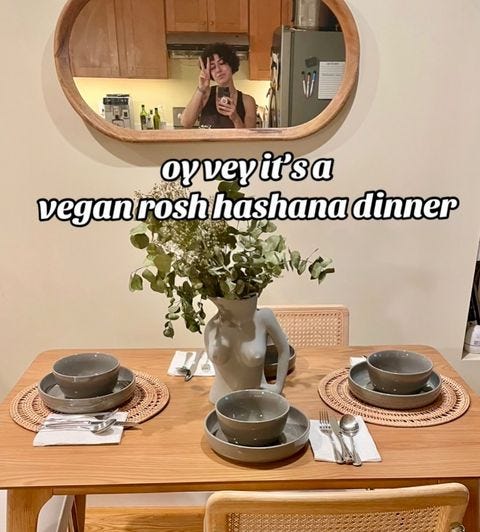Food News: A Third Opinion on American Health and Nutrition
The newsletter that is not paid by Russian state-funded media outlets to lie to you about the connection between food and climate.
hi hi,
it’s been a little too long, that’s on me! how have you been?
this has been a busy high holiday season, which is part of why i’ve had trouble finding time (and tbh the energy) to sit and write.
so today we’ve got a bunch of things i’ve been reading, of course, but also a recap of some spicy and v political nutrition drama that took place at the end of september.
if you’re a certified nutrition nerd like me it has probably been all over your algorithms for the past few weeks, but for the blissfully less-online folks you’ll get a summary and some links to thorough analyses and commentaries that i’ve enjoyed. so vague and mysterious but also just a few scrolls away!
from my own little corner of food and fun:
a couple of weeks ago i had the pleasure of hosting rosh hashana dinner, which is one of my favorite holiday meals and everything turned out nicely. it was a great start to 5785 and i’m wishing a belated shana tova, happy new year, to the tribe!
i also went to chicago, and spent a weekend eating delicious food with one of my best friends. we made a red bean challah together and it inspired me to play around with fun challah fixings at home. for erev yom kippur shabbat I made a cinnamon raisin streusel challah that was absolutely dreamy. i will def continue to lean into the fun and experiment more with flavors and shapes.
-k
What I’ve Read
68 Food, Farm Groups, and Academics Back Kamala Harris’s Price Gouging Ban - This open letter comes from Farm Action, IPES-Food, and other groups spanning the fields of academia, labor organizing, faith, anti-poverty, and farming. It expresses support for Harris’ price-gouging plan I covered in my previous newsletter. The critical issue named in the letter is the need for improved, robust antitrust policies and enforcement to protect workers.
The Hidden Environmental Costs of Food - True cost accounting is a practice of developing prices of animal meats that include the environmental damages of animal agriculture. While not intended to change the actual prices of animal meat products in grocery stores, advocates of true cost accounting think they could be displayed as ways to “nudge” people’s purchasing decisions in a more environmentally friendly direction. Critics say these true prices are oversimplifying the environmental costs or misrepresenting the benefits of affordable food.
I like the idea of true prices for raising awareness of the connection between food and climate and think it would be interesting to see typically hidden costs on all products. However, displaying true costs in retail settings puts a burden on consumers to support “better” products but does not remove the “worse” products from shelves or necessarily impact production. My mind goes to the FairTrade certifications and how we leave it up to consumers to buy the more expensive, “better” products instead of putting the burden on producers and regulators to ensure that products on shelves do not come from unfair and dangerous labor practices.
Revealed: the drivers set to boost Veganuary 2025’s sales- This article validates my concerns about Veganuary, which has essentially added yet another short-term food trend and holiday to marketing calendars. With companies working on adding more limited-edition offers and special packaging each year, Veganuary is promoting overproduction and consumption rather than shifting the food system to replace or reduce animal-based products. Food businesses and restaurants are working to cater to (profit off) the Veganuary audience without necessarily changing how they operate or what they produce the other 11 months out of the year. According to data from various companies, Veganuary seems to be effective at driving consumer interest and purchases (genuinely curious why they don’t continue this year round if it’s popular). This Food Navigator article shared that Veganuary capitalizes on people’s “‘New Year, New Me’” attitudes and the healthwashed ideas people have toward plant-based and vegan products. While I’m happy to have more animal-free options that hopefully make eating plant-based somewhat more accessible, I still don’t think Veganuary signifies meaningful, large-scale change. I’d love to see more data, if anyone has and would like to share!
Actor Simu Liu calls out boba company over cultural appropriation - NGL I hadn’t heard of the show “Dragons’ Den” until this controversy went viral. The show is like Shark Tank and Simu Liu was a guest judge on the panel pitched by the founders of Bobba, “a convenient, healthier, ready-to-drink” bottled bubble tea. In the segment, Liu respectfully but pointedly called attention to the entrepreneurs’ erasure of the drink’s Taiwanese origins. There has been a lot of internet scrutiny of both the pitch as well as the responses by the other judges—including Manjit Minhas who immediately interrupted Liu as he began to call out how Bobba whitewashed a traditional Asian drink and give little cultural appropriation 101. Minhas, who said, “Not everything has to be traditional” agreed on the show to invest $1 million in Bobba but later rescinded the offer.
The solution to cultural appropriation? Liu says it isn’t bullying and death threats. He put out a great video response providing additional context and behind-the-scenes info about the viral moment and what he’s been going through since the episode aired. In his own words, “‘I think we’re starting to lose the plot of what, ultimately, the positive energy of this is, which is let’s educate people, let’s make the world a better place, let’s make people aware that, you know, certain things aren’t okay from a cultural perspective’”.
Misinformation on Climate and Meat Pushed by Russian-Backed Influencers in U.S. - A report from Climate Action Against Disinformation (CAAD) details research that examined 69 websites and social media accounts owned by Tenet Media, a company funded by Russian-state news outlets. These accounts spread misinformation about the climate impact of meat, made fun of Greta Thunberg and other climate activists, and, of course, conspiracy theories about Bill Nye and lab grown meat. This Sentient Media article covers specific influencers involved and shares more about why Russia is fighting so hard to push climate disinformation in the United States.
Can the Government Help Americans Waste Less Food? - “In the U.S., about 35% of food is thrown out before it’s eaten…its production…results in annual greenhouse gas emissions equivalent to that of 42 coal-fired power plants.” Home food waste is a significant problem, and researchers, the Biden-Harris Administration, USDA, EPA, and local governments are working to determine why so much food waste happens and how interventions could be implemented and customized to reduce the issue. This Civil Eats article gives an overview of the food waste landscape and does a deep dive into the legislative actions, research, and campaigns working to combat it.
Is Organic Losing Its Luster? Inflation, Skepticism Reshape Market - The organic health halo might be wearing off. This Food Institute article cites inflation, competition because the organic market has gotten bigger and more crowded, and *drum roll* “consumer confusion about what the label actually means, and questions about whether such foods are worth premium prices”. These are all very valid points and give me hope that some of the messages we nutrition professionals repeatedly yell into the void (internet) are being heard.
Washington Becomes 6th State to Report Bird Flu in Humans - The first reported human cases of Bird Flu (H5N1) come from 4 farm workers who “cull” (kill) birds on a commercial egg farm. This farm had a Bird Flu outbreak that resulted in 800,000 birds being euthanized. That is 800,000 living beings, who were raised solely for food in horrible conditions known to cause health problems exactly like this, were killed and could not even serve their intended purpose. According to reports the infected workers are experiencing mild symptoms and being treated.
A Third Opinion on American Health and Nutrition: A Second Opinion
Quick Summary
At the end of September, Senator Ron Johnson convened a “panel of experts” for a roundtable: American Health and Nutrition: A Second Opinion. The stated goal was to discuss, “a foundational and historical understanding of the changes that have occurred over the last century within public sanitation, agriculture, food processing, and healthcare industries which impact the current state of national health.”
This will be an open tab in my brain for the rest of my life that I’ll be able to click open at any time and immediately launch into a lengthy kvetch sesh.
The “panel of experts” included:
Dr. Jordan Peterson: Don’t be fooled by his title, his PhD is in clinical psych and he spends his time being a rightwing, anti-political correctness, transphobic, carnivore diet enthusiast, and general reactionist hack. Also father of Mikhaila Fuller.
Mikhaila Fuller: Professional keto and carnivore diet influencer who warns everyone about the danger of eating plants and the cures an all animal-based diet has offered her and can work for everyone. Also daughter of Jordan Peterson.
Vani Hari: AKA the Food Babe is an influencer with no formal nutrition or science expertise who makes her living scaring people about their food so that they’ll buy her versions of food, supplements, plans, etc.
Jillian Michaels: Living fitspo Pinterest board famous for being staunchly anti-fat and is most recognizable from her role on TV as a physical trainer who screamed at Biggest Loser contestants.
Courtney Swan: Social media “realfoodology” nutritionist who studied at Maryland University of Integrative Health (formerly Traditional Acupuncture Institute) that will no longer be accredited by the Middle States Commission on Higher Education as of February 1, 2015.
Jason Karp: CEO and Founder of HumanCo and processed food hater despite HumanCo making literally all processed foods. Also gave me some really…off…vibes the couple of times I’ve met him IRL.
Grace Price: An 18-year-old “citizen scientist” AKA champion of doing your own research…even (especially?!) if you have no formal education, experience, or training in a relevant field.
People also on the panel whose names I (proudly) didn’t recognize: Dr. Marty Makary, Brigham Buhler, Dr. Chris Palmer, Max Lugavere, Calley Means, Alex Clark, Dr. Casey Means. Not a single dietitian but there was an extra-special guest appearance from RFK Jr., obvioiusly.
If you want to watch the 4.5 hour event you can do so here but for those who would rather do literally anything else, but still want to be informed on this shonda check out the well-done recaps and analyses from actual qualified experts below.
But first…
Why I Think This Matters
It’s dangerous and embarrassing that our government is platforming anti-science “wellness” influencers who make a living by fearmongering and manipulating people and information in ways that cause very real harm. As much as I’d love to, we can’t waive these people away as fringe quacks. They are leaders in a growing movement that sows distrust in experts, institutions, science, and government regulation.
I’m all for being critical and calling out the very real systemic issues in our country but that isn’t what these talking heads are doing. This group creates fake problems to sell fake solutions and misdirect us in ways that take time, energy, and resources away from addressing problems and barriers people experience with our food and healthcare systems. I wish I could say this roundtable seemed like a lapse in judgment but being completely unserious about nutrition/food/health/science is sickeningly on brand for this country.
Recaps, Analyses, and Thoughts from Trustworthy Sources
The Woo-Woo Caucus Meets— Ok so The Atlantic isn’t my top trusted source on nutrition but this was the first coverage I saw of the roundtable and if I’m honest it’s probably my favorite headline of all time. Journalist Elaine Godfrey connects the issues of the roundtable to the politics of the Making America Healthy Again movement.
Woo woo wellness goes to Washington by — “You don’t need credentials, you just need a platform.” Spence deftly took us back to the era of Graham and Kellogg for some history of the pure food movement and then brought us back to modern times with excellent food for thought questions about healthy lifestyles and the moralization of health.
The Congressional "American Health and Nutrition Roundtable" was an egregious display of anti-science disinformation by — A way deeper dive on the roundtable panelists, their specific bullshit, and how hypocritical they are for demonizing evidence-based science, “Big Pharma,” and “Big Food” while, “hawking unproven, untested, and unregulated modern-day snake oil…”.
I Watched Mikhaila Peterson's Senate Speech So You Don't Have To by — Generously, Harbstreet acknowledges that while Mikhaila Peterson’s speech was overall factually incorrect and lacking in nuance, she raised a few good points that deserve further discussion. Please note “leaky gut” is not one of those points. Something we can draw from this and keep in mind is that “Self-Advocacy is For You, Not For All.” Harbstreet also suggests we: learn to recognize and call out false expertise, stop engaging with mis-and disinformation, and get civically engaged.










You’re right about the generosity 😆 next time I’ll be more withholding
Great write up had no idea about that woo-woo caucus, but I’m not surprised….someone help me before the seed oils rot my brain